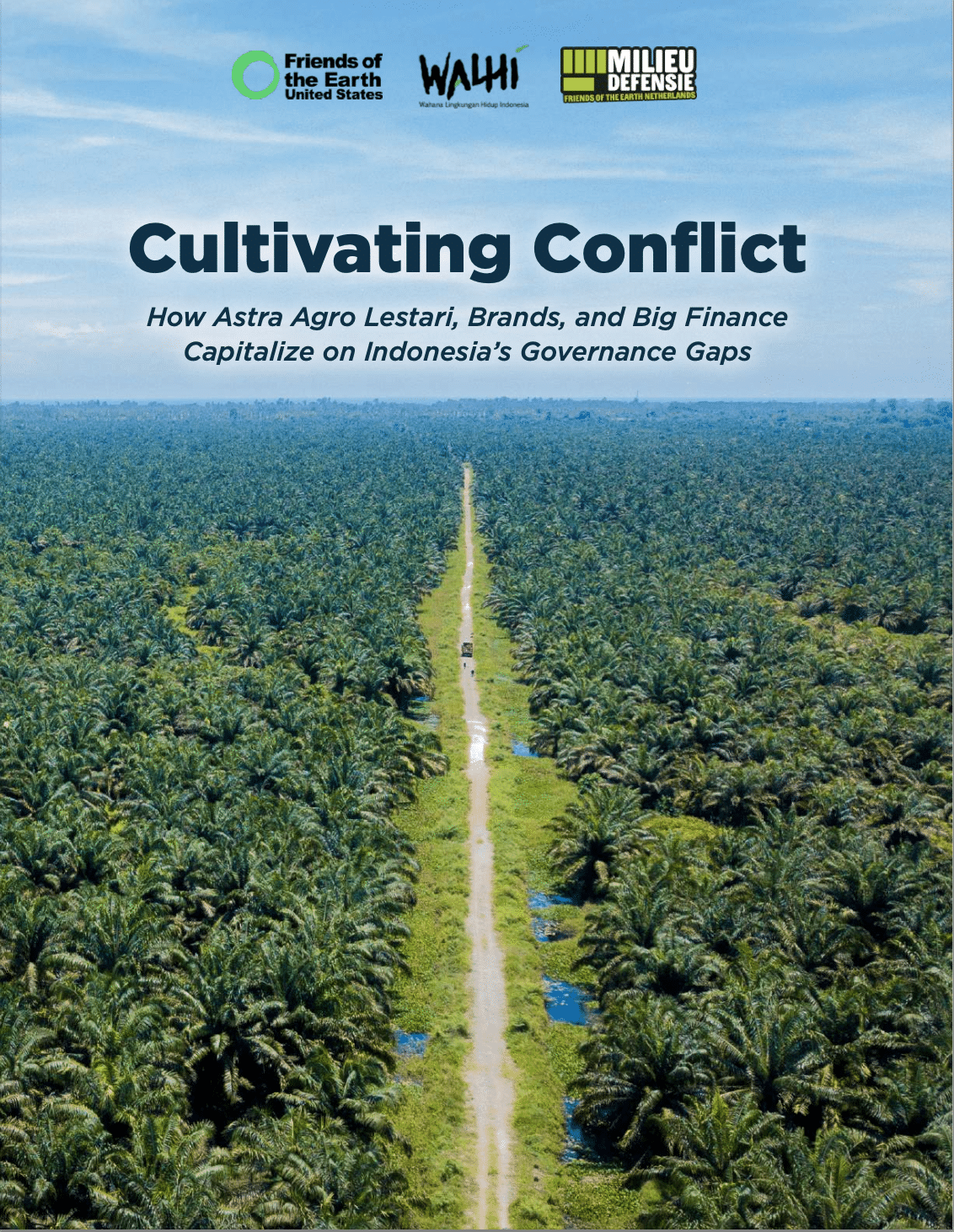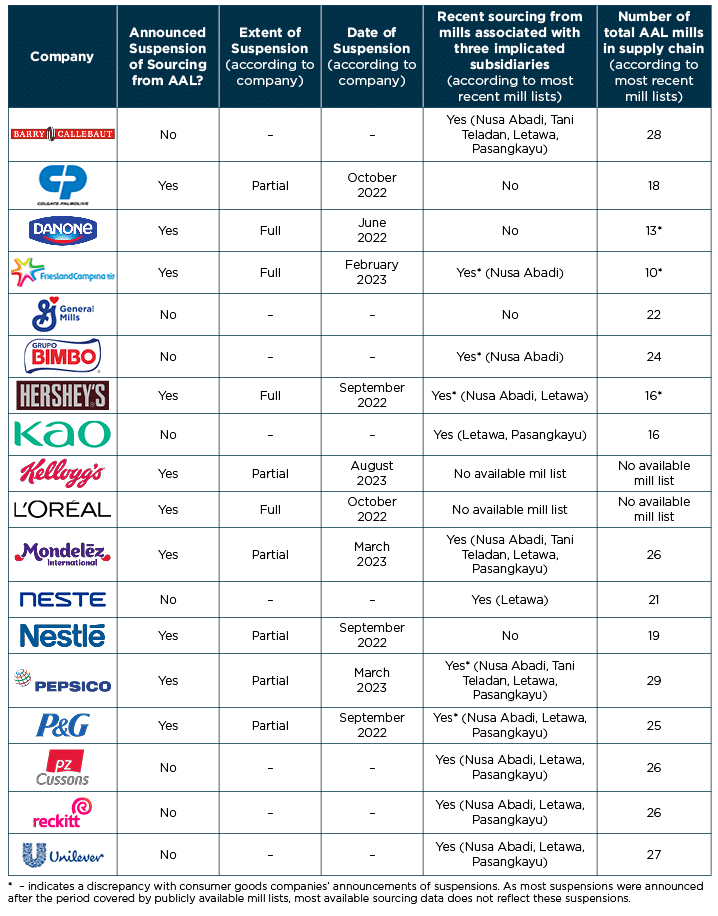Cultivating Conflict

How Astra Agro Lestari, Brands, and Big Finance Capitalize on Indonesia’s Governance Gaps
Cultivating Conflict details how protracted land conflicts, ongoing governance failures, and a lack of accountability define and enable Indonesia’s second largest palm oil company Astra Agro Lestari (AAL)’s controversial operations. The report examines AAL’s ongoing land conflicts with communities in Sulawesi and its failure to provide remedy and redress for harm done, reveals how AAL’s environmental and governance violations appear to be more widespread than initially documented, and details the failures of most of AAL’s buyers and financiers to hold the company responsible by enabling AAL’s conflict palm oil to be sold on the global market.
Key Findings
- 17 AAL subsidiaries’ concessions overlap with 17,664 hectares of Indonesia’s forest estate. 74 percent of AAL’s concessions in the forest estate are in Sulawesi, where 7 AAL subsidiaries’ concessions overlap with more than 13,000 hectares of Indonesia’s forest estate.
- At least 1,100 hectares of AAL’s palm oil plantations in Indonesia’s forest estate appear to be illegal.
- 3 AAL subsidiaries in Sulawesi are operating without the required cultivation permit (HGU).
- Agribusiness traders ADM, Bunge, Cargill, Olam – amongst others – continue to source palm oil from mills associated with implicated AAL subsidiaries.
- At least 18 global consumer brands have a recent history of sourcing palm oil from AAL.
- Financiers including BlackRock, Vanguard, HSBC and Dutch pension fund ABP continue to provide substantial financing to AAL and its parent companies.
Download the report in English
Download the report in Bahasa
Read the press release
Photo gallery
Consumer Brands Sourcing From AAL

Consumer brands, agribusiness traders, and investors continue to enable AAL’s violations by sourcing palm oil from the company, financing its operations, and failing to directly engage AAL to resolve conflicts and remedy harm. Despite sourcing suspensions by 10 consumer brands, numerous companies including Unilever, General Mills, and Barry Callebaut continue to source palm oil from AAL while agribusiness traders including ADM, Bunge, Cargill, and Olam are sourcing palm oil from the mills associated with AAL’s controversial subsidiaries in Sulawesi. Meanwhile, AAL’s operations are bankrolled by some of the world’s largest financiers including HSBC Bank, and enabled by shareholdings in the portfolios of BlackRock, Vanguard and other major asset managers.
Communities on the frontlines of AAL’s destructive operations continue to call on the company to return land taken without consent, provide compensation for loss of lands and livelihoods, conduct environmental restoration to degraded forests and rivers, and apologize for harm done.
Resources
- November 2023 Response to AAL/Eco Nusantara investigation report: WALHI and Friends of the Earth US Response to Verification Report by Astra Agro Lestari and Eco Nusantara on Environmental and Human Rights Violations in Sulawesi, Indonesia
- June 2023 Gap Analysis of AAL/ENS ToR for Investigation: Shifting the burden of proof in the Astra Agro Lestari investigation
- March 2023 Blog: Urgent Action Needed to Prevent Escalating Conflict by Astra Agro Lestari in Sulawesi
- November 2022 Consumer brands scorecard: Consumer goods companies’ responses to human rights and environmental violations by Astra Agro Lestari
- November 2022 Blog: Will consumer goods companies ensure justice for communities that have been robbed of their lands and livelihoods?
- September 2022 International Indigenous Peoples and civil society letter to consumer goods companies: Open Letter from Indigenous Peoples and civil society organisations to consumer goods companies re: ongoing criminalization, human rights abuses, and land grabbing by Astra Agro Lestari and subsidiaries
- March 2022 Blog: Procter & Gamble Sources Suffering from Indonesia’s Forests
- March 2022 Report: No Consent: Astra Agro Lestari’s land grab in Central and West Sulawesi, Indonesia
- January 2022 Blog: Fighting to Win: How an Indonesian Land Defender Stood up to Conflict Palm Oil
Media Coverage
- Allegations widen against Indonesian Palm Oil Giant Astra Agro Lestari. Hans Nicholas Jong. Mongabay. July 9, 2024.
- Indonesian palm oil giant Astra Agro Lestari accused of illegally cultivating forest estates, land grabbing. Yajie Yang. Eco-Business. June 30, 2024.
- Is This Palm Oil Company Operating on Protected Forestland? Jenaye Johnson. Inside Climate News. June 27, 2024.
- Indonesian Palm Oil Firm Accused of Illegal Deforestation. Agence France Press. Barron’s. June 26, 2024.
- Activists slam ‘independent’ probe by Indonesian palm oil giant into violations. Hans Nicholas Jong. Mongabay. December 11, 2023
- Indonesia’s Astra Agro criticised by green groups over report on grievances. Reuters. November 27, 2023.
- Astra Agro Lestari faces fresh criticism after palm-oil supplier probes land-grabbing claims. Simon Harvey. Just Food. November 27, 2023
- Kellogg’s latest to freeze Indonesian supplier over palm oil violations. Hans Nicholas Jong. Mongabay. September 14, 2023.
- Indonesia’s No. 2 palm oil firm faces global backlash over community conflict. Agus Mawan, Hans Nicholas Jong. Mongabay. July 10, 2023
- Under-scrutiny Indonesian palm-oil supplier launches review into abuse of power claims. Simon Harvey. Just Food. April 6, 2023.
- PepsiCo, FrieslandCampina ask suppliers to stop buying AAL palm oil. Jessica DiNapoli, Bernadette Christina, Toby Sterling. Reuters. March 13, 2023.
- Nestle plans to cut ties with Astra Agro Lestari over abuse allegations. Divya Karyza. The Jakarta Post. October 3, 2022.
- Nestle to stop sourcing from Indonesian palm oil producer AAL. Maytaal Angel, Bernadette Christina. Reuters. October 1, 2022.
- Nestlé Says It Will Drop Palm Oil Supplier Accused of Abuses. Daniela Sirtori-Cortina, Dasha Afanasieva, Fathiya Dahrul. Bloomberg. September 29, 2022.
Ways to Support Our Work

Read Latest News
Stay informed and inspired. Read our latest press releases to see how we’re making a difference for the planet.

See Our Impact
See the real wins your support made possible. Read about the campaign wins we’ve fought for and won together.

Donate Today
Help power change. It takes support from environmental champions like you to build a more healthy and just world.